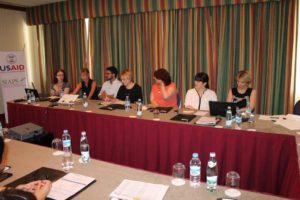In April 2015, USAID and Janssen Therapeutics officially launched the bedaquiline donation initiative, under which Janssen committed to providing free bedaquiline to 30,000 patients with multidrug-resistant tuberculosis (MDR-TB) over a four-year period. Bedaquiline is the first anti-TB medicine to be approved by the U.S. Food and Drug Administration in more than 40 years, and is considered a particularly significant development to aid in the fight against MDR-TB. The public-private partnership between USAID and Janssen Therapeutics will ensure that countries in need can request bedaquiline through the Global Drug Facility at no cost.

The WHO emphasizes active pharmacovigilance in its interim guidelines for the use of bedaquiline in TB treatment. An active pharmacovigilance regime helps ensure safety of patients using new medicines, and an active drug safety management and monitoring (aDSM) system is particularly important for promoting the safe and effective use of bedaquiline. The early detection and management of suspected or confirmed drug toxicity through the active and regular clinical and laboratory assessment of patients receiving new anti-TB drugs, short MDR-TB treatment regimens, and XDR-TB treatment is a key aspect of aDSM.
Georgia was the first country to request assistance from the bedaquiline donation program, and as such required significant technical assistance in the establishment of an aDSM regime. SIAPS is helping to strengthen the pharmacovigilance system in Georgia to support the introduction of new anti-TB medicines in line with WHO guidelines.
Establishing an aDSM system
SIAPS is working with national and international stakeholders, such as the National Center for TB and Lung Diseases, the National Center for Disease Control and Public Health, the National Drug Regulatory authority, Médecins Sans Frontières (MSF), and the USAID-funded TB Prevention Project to mobilize all the available resources and develop an aDSM system in Georgia. With technical assistance from SIAPS, which serves as the group’s secretariat, representatives from these partner organizations have formed a technical working group and drafted a coordinated action plan for aDSM development.
Download this article as a PDF
SIAPS conducted an initial assessment of the current practices and policies for the active monitoring and management of risks and adverse events for MDR- and XDR-TB cases. Following the assessment, SIAPS helped the National TB Program adjust the list and schedule for baseline and follow-up laboratory tests and examinations for TB patients using new medicines, enabling the NTP to better detect and manage adverse drug reactions (ADRs). The corresponding changes were reflected in the national guidelines for the treatment of drug-resistant TB. The Ministry of Health promised there would be adequate state funding for these tests. SIAPS also facilitated a training of trainers on the clinical management and the use of new anti-TB medicines, including the monitoring, detection and treatment of ADRs. There were 20 participants on the training.
The aDSM technical working group agreed that the monitoring of serious adverse events (SAEs) should become an integral function and responsibility of the National TB Program. To this end, the reporting and recording procedures for SAEs have been established and elaborated upon, and a data collection form has been developed. The first group of TB staff from the National Center for TB and Lung Diseases were trained on the process and procedures for aDSM in October 2015, and SIAPS supported the NTP in developing draft aDSM regulations, the finalization of which is pending MoH approval.
Increasing access to lifesaving treatments
There are now 54 pre-XDR and XDR –TB patients at the National Center for TB and Lung Diseases, as well as within the penitentiary system, receiving lifesaving treatment with the regimens which includes the donated bedaquiline. These patients are now treated by doctors who have been trained in the rational use of bedaquiline and other anti-TB medicines—doctors who know how to ensure that the medicines are used appropriately, and who can now effectively monitor, detect, treat and report ADRs related to these medicines. The updated standard treatment guidelines defining the baseline and treatment monitoring laboratory tests and examinations ensure that the ADRs of the medicines are actively monitored and managed.

